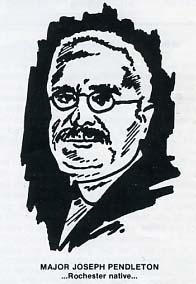
Click Here to Return To Milestones Vol 11 No 3
Far too often our society publicizes our ill in supposedly an effort to promote cures. It would seem that today there are no heroes and even those from our past tend to be forgotten. But, every once in awhile it is nice to pull a hero or two out of the mothballs and recelebrate their achievements. In this way we can perhaps reassess or reassert our own values. Major General Joseph Henry Pendleton, born in Rochester, June 2, 1860, was one such hero. Fortunately, he is by no means a forgotten figure from our past. There is mention of him as early as 1904 in Bauman's History of Beaver County. Since that time, there have been numerous newspaper articles and even a compilation of his personal papers by Martin K. Gordon for the History and Museums Division, U.S. Marine Corps. And, lest we forget, Camp Pendleton in California is named in his honor.
But, how does a man such as Pendleton earn the distinction of "hero"? One definition for the word is: "a person of distinguished valor or fortitude". In other words he/she is an ordinary person who has done extraordinary things. And, Major General Pendleton's military career had been extraordinary.

He was appointed to the United States Naval Academy in 1878. After graduating from the Academy, he was appointed a second lieutenant in the Marine Corps on July 1, 1884 following two years at sea as a Cadet Engineer.
His first duty was performed at the Marine Barracks, Navy Yard, New York where he served from August 31, 1884 to February 7, 1885. From here the new lieutenant joined the USS PENSACOLA on March 20, 1885. He was advanced to first lieutenant on June 28, 1891.
At the outbreak of the Spanish-American War, Pendleton served aboard a converted cruiser, the USS Yankee and took part in the bombardment of Santiago.
The guns in his command fired the last shot of the engagement and during this siege, the retina of his right eye became detached due to the concussion of the rapid-fire and heavier guns. He was promoted to Captain on March 3, 1899 and to Major March 3,1903. On May 28,1904, he joined the First Brigade of Marines in the Philippine Islands.
These highlights from General Pendleton's military career serves to prove that a hero must not only learn from but lead by example.
Pendleton's earliest learning must have been under the tutelage of his father and family. The Pendleton brothers, Captain Gilbert and Captain Joseph Rhodes (General Pendleton's father) came to Rochester in 1856. Prior to their making homes in Rochester, both were in the coasting trade so it is easy to see why Joseph Henry took to the seafaring way of life. Together, the brothers erected one of the first industries in Rochester, a fire-brick works and during the Civil War was one of the few companies giving employment to the town. Later they expanded and operated under the title of Pendleton Bros. & Co.
At different times each held the position as Burgess of the Borough and Joseph Henry's father was Senior Warden and vestry man of Trinity Church, lay reader and superintendent of the Sunday school as well as a member of the local school board.
Pendleton died Feb. 4, 1942 at his home in Coronado, California, at the age of 81. He is buried in the National Cemetery Officers Section - Grave 191.
It is through such examples of leadership that Joseph H. Pendleton came to epitomize this quality. A quality that not only won him recognition on the field of battle but also at any of his "home bases" where he was affectionately known as "Uncle Joe".
Maybe it is time that we too learn from his example. Achievements are made only through hard work, dedication and involvement. Possibly, by following the standards of this man and others like him, can we not help becoming heroes ourselves?
From February to July 1906, Major Pendleton commanded the Marine Barracks, Guam. From September 1906 to September 1909, he commanded the Marine Barracks, Puget Sound, Bremerton, Washington.
On January 1, 1908, he was advanced to the rank of Lieutenant Colonel. Pendleton joined the First Brigade of Marines in the Philippine Islands for his second tour of duty there on November 4, 1909. He performed duty as Commanding Officer, First Brigade and as Post Quartermaster and Commanding Officer of the First Regiment, Olongapo, Philippine Islands. On May 23, 1911, he was promoted to the rank of Colonel.
He was detached from the Philippine Islands in May 1912 and returned to the United States via the Suez Canal and Europe, reporting at the Marine Barracks, Portsmouth, New Hampshire in August 1912. Colonel Pendleton, while attached to Portsmouth, was based on temporary foreign shore service from August 1912 to December that year. This duty covered the period of the 1912 operations in Nicaragua. He was in command of the Marines during the campaign. The skirmishes at Masaya and Chichigalpa and the capture of Coyotepe and Leon occupy high places in Marine Corps history. From February to June 1913, Colonel Pendleton was with an expeditionary force at Guantanamo Bay, Cuba.
From September 1913 to December 1914, Colonel Pendleton was in command of the Marine Barracks, at Puget Sound, Washington and was on expeditionary duty for a good part of this period. Hewas in command of the Fourth Regiment from April to December 1914, on board the LISS SOUTH DAKOTA and at San Diego, California. He was placed in command of all naval forces ashore in Santo Domingo on June 19,1916. He participated in engagements with the enemy at Las Trencheras, at Dona Antonia, at Guayacanes and was in command of the forces that occupied Santiago. During this period (on August 29, 1916) he was promoted to Brigadier General. His final promotion to Major General came on December 10, 1923.1